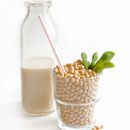How Healthy Are Dairy Alternatives?
 More and more people are starting to turn towards dairy alternatives for varying reasons. While some people switch to dairy alternatives because of a dairy allergy or intolerance, many people are switching to these products because they feel that they will experience improved health benefits. However, if we consume dairy alternatives, are we posing an unknowing risk to our health?
More and more people are starting to turn towards dairy alternatives for varying reasons. While some people switch to dairy alternatives because of a dairy allergy or intolerance, many people are switching to these products because they feel that they will experience improved health benefits. However, if we consume dairy alternatives, are we posing an unknowing risk to our health?
Watch Protein Levels of the Food You Choose
Rachel Scrivin is a registered dietician of FoodFX and she states that consumers need to be aware that many dairy free products contain lower amounts of calcium and protein. She stresses that if you are giving dairy free products, such as soy milk or rice milk, to a growing child or athlete, you are removing a significant protein source from their diet and that needs to be compensated for. She states that if you are opting for dairy alternatives, to choose products that have been fortified with calcium and protein. A problem that she mentions in regards to this point is that organic products cannot be fortified, and with a shift in consumer preference towards organic products this poses an additional problem.
Ms. Scrivin reports that dairy alternatives should not be given to growing children and adolescents without a confirmed allergy or intolerance blood test. She states that the detriment of calcium deficiency can lead to health problems later in life, especially in young female athletes. She states that the biggest risk of consuming dairy free products is calcium deficiency which can lead to osteoporosis and thinning of bones being seen in women as young as 30 years of age.
Supplementing Missing Protein is Important, Too.
Fiona Boyle is a registered dietitian with Food Solutions and she agrees with Ms. Scrivin that consumers need to supplement with calcium if they are consuming dairy alternatives. She also states that there is a concern that individuals consuming rice milk may not be getting enough protein in their diets; and this needs to be supplemented as well.
If you do have an allergy or intolerance to dairy or if you choose to consume dairy alternatives, be sure to choose healthy food that contains calcium as well as protein. Healthy food options that are packed with protein include: seafood, poultry, eggs, beans, soy, pork and lean beef. Incorporating healthy food that is packed with protein will help to ensure your protein requirements are met, even if you can’t (or don’t want to) consume dairy. Healthy food options that contain calcium include: dark leafy green vegetables, beans, legumes, whole grains, nuts and seeds, soy and fortified products. In addition to calcium rich healthy food, taking a calcium supplement may be a good idea to meet your daily calcium requirements. Maintaining daily calcium and protein levels is vital to ensure optimal health, so be sure to include a variety of protein and calcium-rich healthy food as part of your diet.
-
The China Diet
Ive spent the past five years in China, first as an English teacher an
-
Weight control not weight loss strategy works better
An intervention that focuses on weight control rather than weight
-
Lose Weight Fast and Safe – The 2 Secrets You Have to Know
To lose weight fast and safe, you need to start out with the end in mi
-
What To Do If Your Weight Is Getting Out Of Hand?
-
How to Lose Weight for Busy People
We, perhaps find it challenging to slim
-
Stop Dieting Start Living
Just diets dont work, if you want to los
- DON'T MISS
- Weight Reduction Roadmap To Success
- Personal Fitness Can Be A Gateway To A Sound Healthy Body
- No Longer Struggle To Lose Weight Anymore
- Important Things You Should Know About Special K Diet
- Losing Weight Is Not Always Healthy
- Why Do Warm-ups?
- A Low Impact 4 Minute Fat Loss Cardio Circuit
- Nervous About Diet Pills? You Should Be!
- Stop Dieting - Keep A Fitness Journal Instead! Six Essential Areas You Should Be Tracking Now.
- Learn How To Lose 15 Pounds In A Month And Stay So




